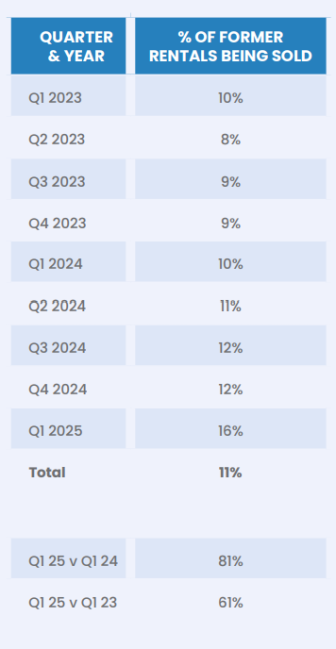 The number of properties being sold by landlords has increased significantly, with 15.6% of all new instructions in Q1 2025 having been previously rented homes – a sharp rise from 9.8% in Q1 2024, new data from TwentyEA has revealed.
The number of properties being sold by landlords has increased significantly, with 15.6% of all new instructions in Q1 2025 having been previously rented homes – a sharp rise from 9.8% in Q1 2024, new data from TwentyEA has revealed.
New instructions for Q1 2025 totalled 451,154 – 70,542, of which were prior rentals or 15.6%.
In research detailed in its latest Property & Homemover Report, TwentyEA, part of the TwentyCi group, found that in Q4 2024 12.2% of all new instructions were properties which had been rented at some point in the last three years within the private rental market. This equated to 39,684 properties.
Of all sold properties in the quarter, only 2.9% were then subsequently let in Q1 2025, meaning 3,634 came back into the rental market – indicating these had been purchased by other landlords.
With approximately 50-55% of new instructions going on to sell, this means around 18,000 properties are likely to or have already left the rental market since Q4 24, exacerbating the supply crisis.
The table below shows the number of previously rented properties coming to market as a percentage of all new instructions and how this trend is increasing over time.
TwentyEA’s analysis also revealed the supply of new ‘to let’ properties fell by 1% in Q1 compared with the prior year and is now 22% lower than the pre-pandemic year of 2019.
The volume of all ‘to let’ homes hit yet another all-time low, with just 284,000 properties currently available across the whole of the UK. This is 18% less than Q1 2024 and 23% lower than pre-pandemic 2019.
Around half (46%) of available properties are listed at prices exceeding £1,500pcm, with over 15% requiring tenants to pay more than £3,000pcm. The average let agreed price has now reached £1,767pcm, making the majority of available properties unaffordable for most tenants.
Katy Billany, executive director of TwentyEA, said: “The rental market remains under significant strain, with tenants across the country facing a chronic shortage of homes.
“Our analysis reveals that a growing number of landlords are selling up to exit the sector and there’s a common misconception that other landlords will buy their properties and reintroduce them to the lettings market. By and large though, this is not what we’re seeing.
“In Q4 2024, approximately 40,000 former rental properties were listed for sale while only 3,600 were let in Q1 25 suggesting they had been purchased by other landlords. If 50-55% of the previous rental homes listed for sale go on to sell, it suggests that around 18,000 homes will exit the private rental sector or have already done so.
“The rental market is experiencing an accelerated adjustment phase as supply constraints intensify and rental costs continue their upward trajectory ahead of the Renters’ Rights Bill implementation. Notably, market indicators have been signalling these shifts prior to the formal introduction of the legislation, reflecting broader underlying dynamics. The private rental sector demonstrates significant volatility, a condition that analysis suggests will persist throughout the near-term planning horizon”.



Huge readjustment in prices coming, the reductions are getting more frequent in the SE but with RRB coming and EPC uncertainty it’s time to cash out.
You must be logged in to like or dislike this comments.
Click to login
Don't have an account? Click here to register
“Now is the time to invest in more BTLs. Those who stay in the industry and maintain good standards are set to do very well. This government has already caused significant disruption and their future proposals are unlikely to be implemented—especially given the timelines they’ve outlined, which extend beyond their expected time in power. Any new government is likely to reverse many of these poor decisions.”
You must be logged in to like or dislike this comments.
Click to login
Don't have an account? Click here to register
I think you’re wrong. The ramifications of the new legislation have not yet been felt, and any new landlord believing now is the time to invest their money in a property over which they have fewer and fewer rights, is likely to find themself in a mess. As to these laws being repealed by a future government, remember, it was the Tories who started the rot.
I believe the future of rental property as an investment class, is in the BTR space.
You must be logged in to like or dislike this comments.
Click to login
Don't have an account? Click here to register
Like any investment, the market has its ups and downs — there are peaks and troughs. But historically, long-term investments tend to perform better over time. It’s not about quick wins or running scared, it’s about staying the course. We’ll have to wait and see how things unfold, but those who remain patient and committed often stand to benefit the most in the long run.
You must be logged in to like or dislike this comments.
Click to login
Don't have an account? Click here to register
In October 2024 at the Committee stage of the Renters’ Rights Bill, housing minister Matthew Pennycook was asked what his biggest takeaway from the day’s hearing was. He said: “We don’t want an exodus of landlords from the sector, but I’ve seen absolutely no evidence of that. I think this is a threat that has been bandied about for many, many years now.” Care to comment now, Mr P?
He also made the irrelevant point that the PRS had doubled in size since the early 2000s. So what? Demand has increased even more. The Renters Rights Bill will not lead to even one additional property being offered for rent. There is not a dot or comma in it that helps landlords, not a single syllable to deal with rogue tenants. Indeed the Bill encourages dishonest tenants and creates unnecessary problems for landlords.
One example of an unnecessary problem will suffice. Landlords will have to complete the tenancy (at which point the tenant is entitled to possession) before the tenant pays the first instalment of rent. If the rent is received even ten seconds before the tenancy is signed, the landlord will be in breach and liable to a fine. Why, oh why? OK the landlord may have a deposit but why should the landlord have to risk the tenant defaulting immediately? He will then have to wait three months before beginning s8 proceedings for arrears. It is unlikely to happen but it might. How does this help honest tenants? It doesn’t. It will lead to rents increasing to mitigate the risk.
You must be logged in to like or dislike this comments.
Click to login
Don't have an account? Click here to register
Wouldn’t touch anyone without a property owning guarantor.
You must be logged in to like or dislike this comments.
Click to login
Don't have an account? Click here to register
Guarantors and rent guarantee insurance provide strong forms of tenant security. However, this may exclude a significant portion of renters. This is a strategy many private landlords may adopt, which could result in less housing availability for vulnerable tenants and increased pressure on local governments to accommodate them through social housing.
You must be logged in to like or dislike this comments.
Click to login
Don't have an account? Click here to register
Not one benefit for landlords but it is bill only for renters. I can foresee tenants enjoying a rent free life for many months or maybe even years. I also read that landlords may be banned from requesting a guarantor which will exclude many from ever finding a home. Rent arrears are almost impossible to be reimbursed which is the reason landlords used s21 and just wrote them off. CCJ will be handed out like confetti.
You must be logged in to like or dislike this comments.
Click to login
Don't have an account? Click here to register
The industry is not seeing a mass sell off of rental properties, its more of the case of the private landlords whom ‘manage’ their own rental properties exiting the rental market due to increasing costs, legals, court fees etc. as well as the obvious stamp duty and interest rate rises of the last few years. The big estate agents, the likes of Dexters, Foxtons, Lomond to name a few are well placed with in-house legal teams, rental teams etc and can easily absorb additional costs which are ultimately included in tenancy premiums on behalf of the respective landlords. It’s a business at the end of the day and should be treated just like any other business .
You must be logged in to like or dislike this comments.
Click to login
Don't have an account? Click here to register
The stats speak for themselves. A drop of more than one fifth in available rental properties since before lockdown is disastrous, and helps to explain why there are so many tenants looking for each property.
As for the estate agents, they are just letting agents, and the landlords who own the properties are on the hook. When a tenant stops paying, the letting agent still expects to be paid, just like the lender!
You must be logged in to like or dislike this comments.
Click to login
Don't have an account? Click here to register
This is when you find out how good your Agent is, obviously they like Landlords are in for the long term-if I had an Agent that tried to charge when the tenants were not paying I certainly wouldn’t stay with them as they are the gate keeper.
You must be logged in to like or dislike this comments.
Click to login
Don't have an account? Click here to register
I agree, but I can see the agent saying it’s not their fault the tenant isn’t paying, and the landlord should carry insurance to cover the lost rent and fees.
What do agents say?
You must be logged in to like or dislike this comments.
Click to login
Don't have an account? Click here to register
As an agent, I operate on a simple principle, if I can’t collect the rent, I don’t get paid. That’s why we work hard to protect both our business and the interests of the landlords we represent. I fully support the idea of legislation for landlords who choose not to use agents. Most professional agents, especially those who follow existing rules and regulations, do a great job.
I’m a strong advocate for regulation of both agents and landlords, similar to the financial services model. There, advisors can either be directly authorised or act as representatives of a network. In our industry, agents who are members of a professional association could play a similar role—acting as a trusted network representing landlords and helping to raise standards across the board.
You must be logged in to like or dislike this comments.
Click to login
Don't have an account? Click here to register